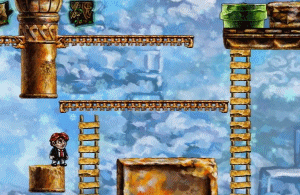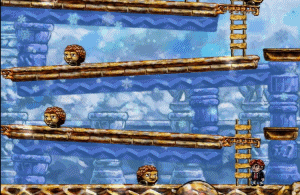 Review:Braid (XBLA)
Review:Braid (XBLA)

Platform/Puzzle
The most original Mario rip-off ever.
![]()
Rich
Oh man, this is going to be a tough one. Describing a game that, once you know how to solve it, lasts forty five minutes without spoiling any of the surprises it offers and, as you’ll come to learn later in this review, it’s a bitch to score this one as well.
Let’s start with the basics. Braid, the third game in the ‘Summer of Arcade’ series on Xbox Live Arcade, is a platforming game which on first impressions appears to be a pretty direct rip-off of the 2D Super Mario titles. You run left and right, climb ladders, jump over gaps and, most tellingly of all, can kill enemies by jumping on them.
The game is split into six worlds, each made up of several stages and the objective is to collect the puzzle pieces that lie within. In World 2, the first world you get to play on, this generally involves gaining extra height by jumping on beasties (creatures not rappers). So far, so standard but Braid is far more than just a simple platformer and this is due to how the game allows you to manipulate time.

Braid in a rare 'just a platformer' moment.
On the first level your character, Tim, can reverse time by holding down the X button. This allows you to perfectly time some otherwise very tricky jumps and correct mistakes and misjudged manouvres instantly. Getting those first ten puzzle pieces will still require some lateral thinking, as you’ll find if you attempt to complete the demo, especially those last two. However, this is just a mere hors d’Å“uvre compared what the other levels allow you to do.
It’s not for me to explain the mechanics of the later levels. Each variation on the themes of World 2 comes as a pleasant surprise, often raising a wry smile before the devious puzzles ahead take over and get your teeth gnashing. Braid is certainly no cake walk. Sure, the platforming elements are, at times, perfunctory and, for the most part, require just basic 16-bit skills but the lateral thinking required to get those puzzle pieces will have you thinking of quitting several times before the answer comes.
The great thing is that it will come. After five minutes or an hour (or maybe longer if you’re as dense as me) but you’ll get there and you’ll pity the fool that uses GameFAQs and robs themselves of such satisfaction. Indeed, at times World 5 had me tempted to fire up my laptop and grab that solution but that was never an option. It’s that sense of smug self-satisfaction that keeps you going and, unlike something like Echochrome, it’s never trial and error. Jonathan Blow couldn’t have made these puzzles any more perfect.
That’s almost everything I want to say about the gameplay apart from that the time manipulation isn’t a gimmick and isn’t just a cheap way to make difficult sections more playable. It’s so much more than that, but you can only really appreciate that by experiencing it first hand.

Braid's nod to Donkey Kong. It's not a rip-off when they admit it.
Presentation is also where this game scores highly. From the very start of the game the game oozes class with beautiful handpainted-style backdrops that evoke memories of Okami, although these are at odds with the character graphics in the game which are simplistic, and a little ugly, in comparison. The overall look, especially when combined with the time-manipulation effects, is very pleasing though and gives the game that ‘yeah, I’m good’ confidence rather than showering the player with gaudy three-dimensional clutter like most games on XBLA seem to.
The soundtrack is also suitably splendid with beautiful instrumental pieces that match the melancholy feel of the game. Again, this game doesn’t need to throw bombastic techno or child-friendly jaunty tunes at you. Like the puzzles, nothing feels wasted or overdone. It’s just perfect.
|
Gecks Secondary Review Braid is a high-concept affair – “you’re Tim, you control time.” You’ll likely spend the first few screens expecting some new powerup will be round the corner to help you get that elusive jigsaw piece. The realisation that it never comes and everything is just a time warp away is magnificent. The attempts at becoming a virtual essay on relationships and the very nature of ‘mistakes’ are welcome, but not entirely successful. It takes a literary master to plum the depths of the human condition, and whilst the introductory texts to each world irritate as much as they intrigue, players will find it easy to apply their own story to general themes. However, persist in solving all the worlds and the closing epilogue is a devastating and mature conclusion, giving much weight to the preceding narrative. Much has been said of the prohibitive 1200 points price tag. £10 in real money – a small round of drinks – for what is arguably the best game on the Live Arcade. I don’t know about you, but I am a man of means – I own several hardback books when paperback versions exist. £10 is fine. Braid makes you think differently, and what could be a better selling point for our hobby? The thrills it gives you could only be possible via a controller attached to a screen. Secondary Score: 9/10 |
However, it’s not all good news and this is where the soul-searching begins. For all of its successes, Braid falls down on one key issue and that is value for money. Firstly, the game costs 1200M$P (£10.20) rather than the usual 800. This brings into question all sorts of questions about Microsoft and how much they value their customers. Is this game really worth that extra fifty percent? It’s certainly no bigger than the usual XBLA effort and, whilst it is clearly a labour of love, doesn’t seem to require that much more technical expertise. Also, as a mostly one-man effort, I can’t imagine that development costs would be any more an issue than if it was a group effort (although Jonathan Blow did allegedly sink £180,000 of his own money into the project).
The game’s biggest problem is that in reality it has zero replay value. I finished it almost a week ago and haven’t felt compelled to load it up since and probably never will again (unless I decide to attempt an achievements-maxing speed run which isn’t a particularly appealing option). So, a tenner for a few day’s play? That’s never a good deal is it?
Here’s what I think. Braid is an experience. It’ll make you think differently. It’ll challenge you to be a little smarter than normal. But more than that, this game will make you feel something. From the evocatively written story sections to the superb ending, this game tells a story of loss and regret that asks more questions than it ever needs to answer. Poetry in motion perhaps?
… and so to the score. My heart often said ten. The game caught my imagination and made me ignore my consumer instincts to save those 1200 points and I’ve never regretted it but, one week later, Braid is just a memory. A beautiful one and one that will linger way past this generation of gaming but longevity is an issue and Braid doesn’t deliver on that score. But with no more levels planned, maybe it was never meant to and, for once, that makes perfect sense.
Rating: 








 9/10
9/10
